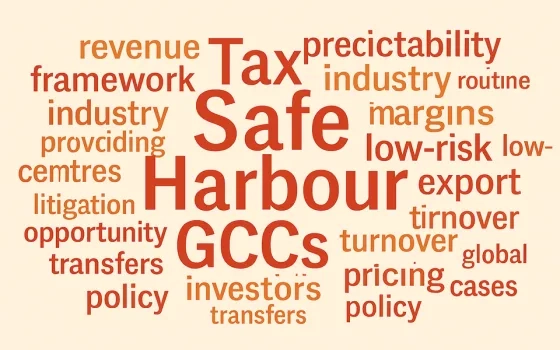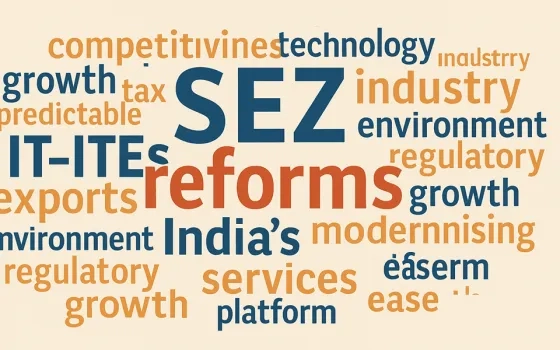On May 27, the Reserve Bank of India (RBI) released its Annual Report for the year 2020-21. The Report covers the working and functions of the Central Bank for the transition period of nine months (July 2020 - March 2021) following the decision to change its accounting year from July-June to April-March.
FinTech Related Developments (2020-21)
According to the Annual Report, the COVID-19 pandemic has resulted in new business opportunities despite uncertainty and stress for some FinTechs. As the broader economy shifts from “respond” to “recover”, new employment opportunities may be created by some FinTechs. Here are some key developments during the last year:
- Reserve Bank Innovation Hub
The Reserve Bank in its Monetary Policy Statement on Development and Regulatory Policies dated August 06, 2020, announced that it will set up Reserve Bank Innovation Hub (RBIH) to promote innovation across the financial sector by leveraging on technology and creating an environment which would facilitate and foster innovation. RBIH is guided and managed by a Governing Council (GC) led by a Chairperson.
Aimed at accelerating financial inclusion, the Hub will test potential new capabilities, opportunities in technology and leverage on the same to create viable products or services and enable their adoption for wider reach and greater impact across the country.
It will develop internal infrastructure to promote fintech research and facilitate engagement with innovators and start-ups.
In a move to promote technological innovations aimed at financial inclusion, RBI had proposed to set up regulatory sandboxes where startups could test new products, services or business models with customers in a live environment, subject to certain safeguards and oversight. On August 13, 2019, the central bank released the final Enabling Framework for Regulatory Sandbox after a wide-ranging consultative process with stakeholders. Thereafter, on November 4, 2019, the Reserve Bank announced the opening of first cohort under the Regulatory Sandbox (RS) with ‘Retail Payments’, as its theme. After a year on December 16, 2020, RBI announced the opening of second cohort under RS with ‘Cross Border Payments,’ as its theme. A total of 27 applications was received under the second cohort. These applications are being scrutinised as per the approved standard operating procedure. Further, it was also decided that the theme for next cohort shall be ‘MSME Lending’ in order to foster innovation in lending to MSMEs.
- RegTech Solutions for Effective and Focused Regulations
RBI has entered into Cooperation Agreement (CoA) on FinTech with International Finance Corporation (IFC) –a member of the World Bank Group (WBG). Under the scope of CoA, among others, IFC will provide knowledge/advisory support on RegTech/ SupTech initiatives. To understand the level of RegTech adoption in the country, a survey was conducted among a few Regulated Entities (REs) to understand existing/potential use of RegTech by REs, risks and challenges faced and the expectations of REs from the regulators.
The Reserve Bank has joined the Global Financial Innovation Network (GFIN), a network of over 50 organisations committed to support financial innovation. GFIN has three work streams, namely - “Collaboration”, which focuses on how to help regulators in collaborating and sharing of experiences of innovation; “Cross-Border Testing”, which focuses on running cross-border testing of innovative products and services; and “RegTech and Lessons Learned”, which focuses on sharing RegTech knowledge, collaborating on areas of mutual interest such as potential cross jurisdictional efficiency. Participation in any of the above three work streams of GFIN will help in enhancing the FinTech related activities in India.
- Inter - Regulatory Technical Group on FinTech
An Inter-Regulatory Technical Group on FinTech (IRTG on FinTech) has been constituted under the aegis of Sub-Committee of the Financial Stability and Development Council (FSDC-SC). The Group is chaired by Chief General Manager (CGM) of DPSS with representatives at the level of the CGM from other financial sector regulators, viz., Securities and Exchange Board of India (SEBI), Insurance Regulatory and Development Authority (IRDAI), International Financial Services Centres Authority (IFSCA) and Pension Fund Regulatory and Development Authority (PFRDA) and one representative each from the Ministry of Finance and MeitY.
In its first meeting held in March 2021, it was decided that financial sector regulators shall co-ordinate and share information among members on their innovation initiatives. Further, members also agreed to suggest models on Inter-Operable RS mechanism for hybrid products/services to facilitate framing of standard operating procedure (SOP).
Plan for 2021-22
The Annual Report suggests that the prospects for FinTech in India’s financial system in 2021-22 will depend upon the degree of entrenchment of digital usage, which is, in turn, contingent upon the resilience of the underlying acceptance infrastructure, financial literacy and awareness of the users (both merchants and consumers) and strengthening of the customer protection and cyber security protocols in place. These factors will help build trust of users in digital modes.
The agenda for next year is based on the goalposts identified in the ‘Payment and Settlement Systems in India: Vision 2019-21’. Here it is:
- Encouraging Healthy Competition
The Reserve Bank shall initiate discussion to develop a framework for settlement risk management with increased participation of non-banks in centralised payment systems.
- Improving Customer Convenience
The Reserve Bank had announced that pilot schemes for offline payment solutions would be conducted till March 31, 2021. Based on the experience gained through these pilot schemes, RBI shall decide on implementing offline payment solutions in the country.
The Central Bank plans to explore National Settlement Services for Card Schemes- facilitating settlement of card transactions processed by various card payment networks through the accounts of card payment networks maintained with the Reserve Bank. Settlement of card transactions in Reserve Bank books shall increase confidence in card transactions.
RBI will examine the role that the payment services providers (PSPs) can play to ensure friction free remittances at lower cost.
RBI is planning to rollout geo-tagging of payment system touch points. It has established a framework to capture the location and business details of commercial bank branches, ATMs and business correspondents (BCs). It is envisaged to extend a similar framework to capture and maintain information about Points of Sale (PoS) terminals and other payment system touch points as well.
The Reserve Bank shall examine the need for third party risk management and system-wide security of the regulated entities.
Digital Payments
During 2020-21, the number of PoS terminals increased by 6.5 per cent to 47.20 lakh and the number of Bharat Quick Response (BQR) codes deployed increased by 76.0 per cent to 35.70 lakh as at end-March 2021. Further, the number of ATMs marginally increased by 2.0 per cent from 2.34 lakh at end-March 2020 to 2.38 lakh at end-March 2021.
RBI has taken several steps over the last year to increase adoption of cashless and digital payments in the country. These include:
- introduced video-based know your customer (KYC) to enable non-bank Res to authenticate their users/customers without the need of Aadhaar,
- created Payment Infrastructure Development Fund (PIDF) to provide impetus to acceptance infrastructure to promote digital payments and commerce platforms for rural MSMEs,
- introduced Online Dispute Resolution (ODR) system for resolving customer disputes and grievances pertaining to digital payments,
- organised consumer awareness campaigns on digital payments,
- put in place a framework for creation of a Self-Regulatory Organisation (SRO) for engaging with the regulator/ supervisor,
- constructed and published a composite DPI to effectively capture the extent of digitisation of payments across the country,
- allowed authorised PSOs – banks and non-banks – to conduct a pilot scheme for offline payment solutions using cards, wallets, or mobile devices for remote or proximity payments to encourage technological innovations that enable offline digital transactions,
- released a framework, stipulating eligibility criteria, scope and governance structure for entities interested in setting up a pan-India umbrella entity for retail payments,
- operationalised RTGS on 24x7 basis,
- permitted authorised non-bank PPI issuers and Payment Aggregators (PA) to maintain an additional escrow account in a different scheduled commercial bank. This measure has helped diversify risk and address business continuity concerns,
- mandated that existing proprietary QR codes shall migrate to interoperable QR codes by March 31, 2022 and there shall not be further issuance of proprietary QR codes,
- enhanced the per transaction limit permitted for contactless transactions (also known as tap and pay transactions) using Near Field Communication enabled EMV chip cards without the need for AFA from INR 2000 to INR 5000,
- advised all authorised PSOs and their participants to undertake targeted multilingual campaigns by way of SMSs and advertisements in print and visual media to educate their users on safe and secure use of digital payments.











